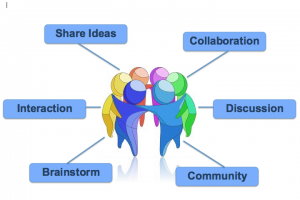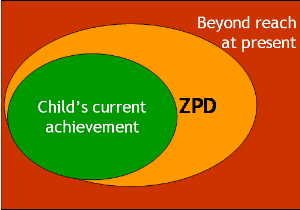Vygotsky had several supporters of his theory of socio-cultural learning. There have also been some who view the theory as incomplete, noting it does not spend enough time focusing on individual in knowledge acquisition aside from collective social interaction. Some have also found that the Zone of Proximal Development (ZPD) is vague in its explanation of how learning actually occurs.
One of the main criticisms of Vygotsky was that theory ignores the role of the individual and in contrast emphasizes the social or collective. In Vygotsky’s theory the mind is not seen as autonomous from the sociocultural group. Vygotsky argued that knowing is relative to the situation in which knowers find themselves. The theory does not acknowledge that therein lay a possibility for anyone to rise above social norms based on their ability to generate personal understandings ( Lui & Matthews, 2005). The theory for example, does not acknowledge gifted students or prodigies, who may not experience social interaction with a “more knowledgeable other” but still progress to an expert level.
Secondly, the theory was assumed to be applicable to all cultures and abilities. Vygotsky’s theory viewed social groups as being a whole and equal, with the potential to extract the same meaning from engagement. However, collaboration and participation differ for every individual and thus, inequalities exist for each person. Differences in skill-set are always present, offering constraints in learning. A student with autism for example, may not extract the same meaning from group interaction as a student without autism (Lui & Matthews, 2005).
Another issue with Vygotsky’s theory, is that the Zone of Proximal Development (ZPD) is very vague and does not contain an accurate picture of a child’s learning style, current ability level, or motivational factors. It also does not explain the process of development or how exactly development occurs. The model itself offers little detail.
Perhaps the greatest disappointment of Vygotsky’s Theory, however, is that it appears to be somewhat incomplete. This was likely in part due to his death at a young age. It cannot nevertheless be ignored that Vygotsky made invaluable contributions to the field of education and psychology.
References
Chaiklin,S. (2003). The zone of proximal development in Vygotsky’s theory of learning and school instruction. In: Kozulin, A., Gindis, B., Ageyev, V. S. and Miller, S. M., eds. Vygotsky’s educational theory in cultural context. Cambridge: Cambridge University Press, 39–64. http://dx.doi.org/10.1017/CBO9780511840975.004
Lui, C.H. & Matthews, R. (2005). Vygotsky’s philosophy: Constructivism and its criticisms examined. International Educational Journal, 6(3), 386-399,
Rogoff, B. (1990). Apprenticeship in thinking: Cognitive development in the social context. Oxford: Oxford University Press.


